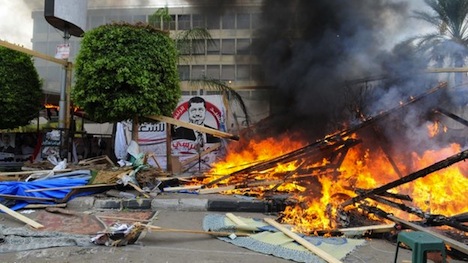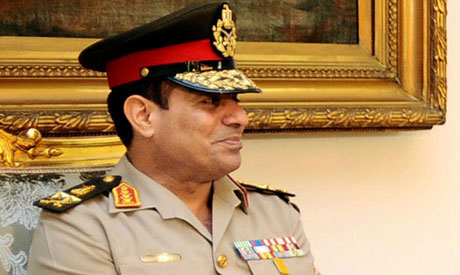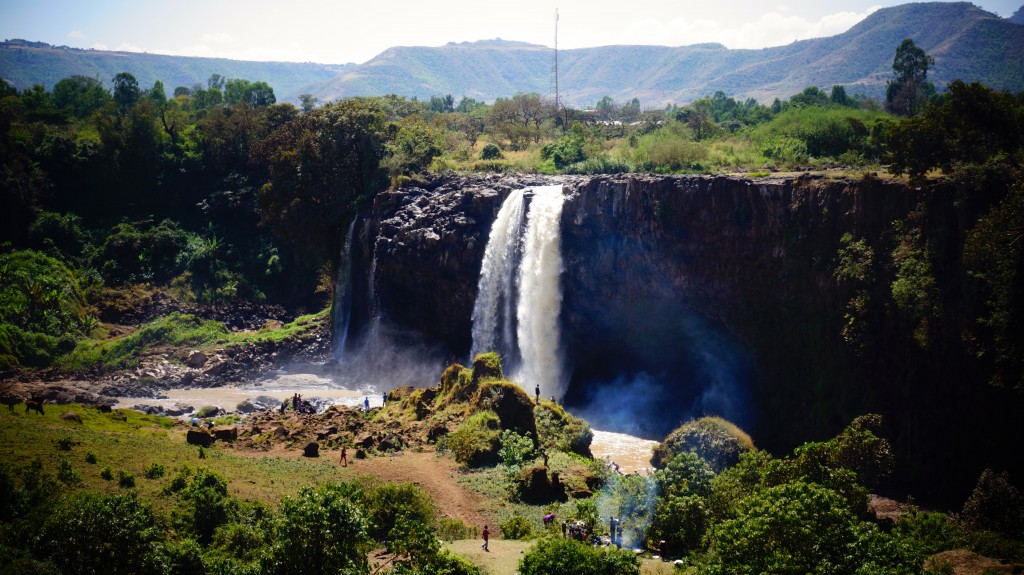In slaughtering civilian protesters and declaring a one-month ‘state of emergency,’ the Egyptian military’s interim government is falling back on the methods of former president Hosni Mubarak’s three decades in power that amounted to one, long 30-year state of emergency.![]()
If you did not harbor any doubts about the nature of the interim government before today’s massacre, you should now — even state officials agree that at least 149 people have been killed in today’s violence, but the Muslim Brotherhood believes up to 800 people have been killed, and anecdotes from journalists also suggest more fatalities than the official count. Egypt’s liberal interim vice president, Mohamed ElBaradei resigned earlier today in the aftermath of what can only be described as a systemic nationwide assault against the supporters of deposed president Mohammed Morsi.
Even by the interim government’s standards, the violence perpetuated today far exceeds the two most violent days of the post-Morsi era — on July 8, when the army fired on Morsi supporters in Cairo, and on July 27, when the army killed 80 Morsi supporters.
At each juncture, as the military has escalated the violence against the Brotherhood, it has only narrowed the path toward a political settlement.
But Morsi didn’t kill hundreds of protesters, despite his vast shortcomings, and the surest way to engender solidarity between Egypt’s liberals and Morsi’s supporters (which barely seemed thinkable six weeks ago) is for the Egyptian military to start massacring innocent civilians. The wiser course would have been to get on with the business of repairing Egypt’s economic infrastructure and preparing the country for yet another round of elections while ignoring what were certain to become dwindling protests in favor of a president who long ago lost the confidence of the vast majority of Egyptians — an imperfect course, but one that envisions a speedy return to ‘normal’ politics.
Today’s bloodshed has pushed that return to ‘normal’ politics far off into the distance, giving Egypt a regime that’s, in substance, the second coming of the Mubarak era, ‘states of emergency’ and all.
U.S. secretary of state John Kerry must certainly regret his words earlier this month when he remarked that the military government was ‘restoring democracy’ in the post-Morsi era. In the United States, president Barack Obama has strongly criticized the violence, but it’s worth wondering just what influence the Obama administration has had in failing to rein in the Egyptian military’s excess today. Egyptian army chief Abdel-Fattah El-Sisi and U.S. defense secretary Chuck Hagel have talked often since July 3 when Egyptian military forces detained Morsi and declared an interim government, even as most of official Washington spent the past six weeks wringing its hands over the peripheral question of whether the U.S. government should label Morsi’s ouster a coup. Though the result of designation El-Sisi’s coup a ‘coup’ for U.S. legal purposes would be to strip the Egyptian military of U.S. aid, it should be a blinding glimpse of the obvious by now that the aid Egypt’s military receives from other Gulf nations now outweighs U.S. aid, and U.S. support is clearly not sufficient to bend the Egyptian government’s actions to American will.
But in a familiar pattern, the interim government is becoming more isolated, much like the Morsi administration and the Mubarak regime before it. The interim government long ago lost the hesitant support of the conservative Salafist movement, an even more pro-sharia group than the Brotherhood. It has now lost ElBaradei, the former director general of the International Atomic Energy Agency and the most prominent of several liberal leaders within the National Salvation Front (جبهة الإنقاذ الوطني), and one of the most respected Egyptian voices abroad.
So tragic as today’s massacre has been, it’s no surprise that Egypt looks today more like one of the repressive Gulf states, like Bahrain, and less like a liberal democracy. Morsi remains in detention, and former prime minister Hesham Qandil and other top Brotherhood leaders remain in prison. Transitional president Adly Mansour still has not set a timetable for new elections, and it is hard to know just how free and fair any elections can be when one power base within Egypt has declared a state of emergency to hunt out, disperse and kill supporters of another power base within Egypt. Certainly the lesson that Islamists in Egypt have taken from the Morsi episode is to mistrust democracy as a legitimate tool of governance — it’s not the end of political Islam, in Egypt or elsewhere in the Arab world, but it remains to be seen just how much Muslim Brotherhood supporters should trust promises of free elections in Egypt’s near future.
Despite today’s horrific violence, it is still too early to throw around louche analogies to Algeria 1991 and fret that Egypt, the Arab world’s most populous country, will slip into a civil war. More likely, the Egyptian military will continue to assert control, obviously though violent and repressive means as necessary and, elections or not, Egypt 2013 will come to look more like Egypt 1993 than anything else. The best-case scenario now seems to be a kind of neo-Kemalist system where Egypt’s military returns to elections, but takes a strong hand in ‘guaranteeing’ democracy by knocking down Islamist governments that become too aggressive. Continue reading Egyptian massacre, ‘state of emergency’ mocks Arab Spring with return to Mubarak-era tactics








